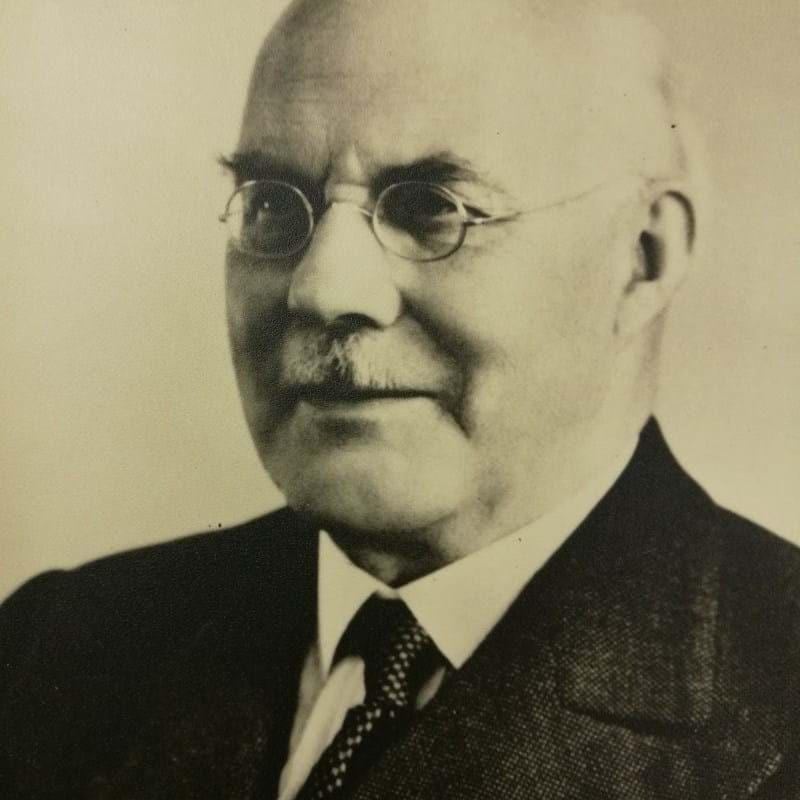
Sir Harold Hartley KCVO CBE MC DCL FRS: 1951–1953 and 1954–1955
Sir Harold Hartley is an academician, who began his career in chemical engineering before the profession was constituted as such, who has applied himself with distinction to the betterment of industry.
He was educated at Dulwich College and at Balliol College, Oxford, where, having taken a First in Natural Science, he became Natural Science Tutor and Bedford Lecturer in Physical Chemistry.
At the outbreak of the First World War he joined the Army, and after service as a Captain in the 7th Leicestershire Regiment he was appointed Chemical Adviser to the 3rd Army in 1915. In 1917 he became Assistant Director of Gas Services at General Headquarters, France, and the following year he was appointed Controller of the Chemical Warfare Department of the Ministry of Munitions, where as a first-class physical chemist he was thrown into a maelstrom of chemical engineering, and there received a professional 'baptism of fire'. His war record is therefore a record of success as a soldier in the field - he was awarded the MC and was mentioned three times in despatches - and as a controller and administrator for which he was honoured with the CBE. He became Head of the Inter-Allied Mission which inspected the German chemical factories after the Armistice, and as such had much to do with the Report of the Mission which was to have an important effect on the development of the chemical industry in this country.
After the war he returned to teaching and he greatly contributed by his own work and that of his pupils to the building up of a notable School of Physical Chemical Research at Oxford. At the peak of his academic career he was honoured with a knighthood and elected a Fellow of the Royal Society, while recognition at Oxford was made tangible with the award of a Jowett Fellowship and later a Research Fellowship.
He became a member of the Board of the Gas Light and Coke Company Ltd in 1922 and, as such, was particularly concerned with chemical engineering problems at the tar products works at Beckton. But it was not until 1930 that he left Oxford to begin his career of industrial service when he became Director of Research and Vice President in charge of the Engineering Department of the London, Midland and Scottish Railway Co Ltd, with which he was associated until 1945. Among his other roles were President of the Cast Iron Research Association (1930-1933), President of the British Rubber Manufacturers' Research Association (1937-1946), Chairman of the Fuel Research Board (1932-1947), Chairman of the Railway Air Services (1934-1945), Chairman of the Air Ministry Aviation Fuel Committee (1938-1940), Honorary Advisor to the Mines Department and to the Ministry of Fuel and Power (1939-1947), Chairman of the Management Committee of the Heysham Aviation Fuel Factory (1940-1945) and Chairman of the Cabinet Sub-Committee on Axis Oil during the same period. From 1946-1947 he was Chairman of the British European Airways Corporation, and then Chairman of the British Overseas Airways Corporation from 1947-1949, when he became Chairman of the Electricity Supply Research Council of the British Electricity Authority.
During his career he received numerous honours including Honorary Fellowship of Balliol College, Honorary DCL of Oxford, Honorary DSc of the University of Sheffield, Princeton and Birmingham, and Honorary Associate of Manchester College of Technology. From 1935-1950 he was Chairman of the British National Committee and International Executive Council of the World Power Conference and in 1950 was President of the British Association for the Advancement of Science. Outside of the sciences he was Prime Warden of the Goldsmiths' Company (1941-1942), senior member of the Court of Assistants of the Goldsmiths' Company, and Director of 'The Times'.
Return to list